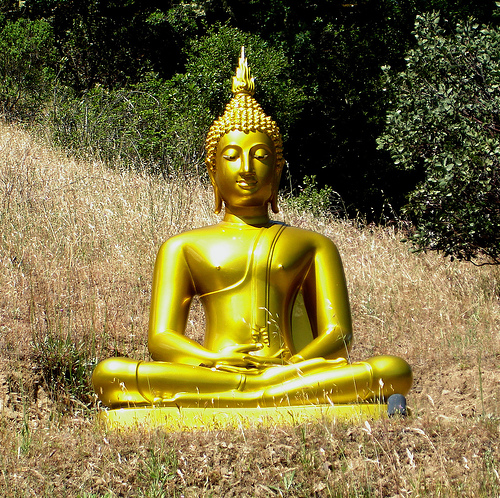“Try not to become a man of success but rather a man of value.” –Albert Einstein
As I was getting my coffee the other morning, I thought about this article I once read on a popular news site about a man who lost his big corporate job and accepted a barista position at Starbucks.
When he decided to don a green apron, he’d lost everything in life—including his marriage, his livelihood, and his health. Through his experience in the hospitality industry, he gained a sense of humility and peace, away from the hectic world of professional ambition.
When I read this article, I remember thinking it was interesting that, as a society, we’re fascinated with people who fall from grace and then learn to love a simpler life—and yet we don’t generally attribute the same awe to people who choose that from the get-go.
I know many people who’ve chosen to work as waiters and retail sales associates, only to find themselves the recipients of well-intentioned advice from friends who think they should aim higher in life.
From a very young age, we’re taught to reach for the stars and believe in our potential—and to be careful not to become complacent underachievers.
We learn that ambition is a sign of self-confidence, competence, and intelligence, and the ultimate indicator of success in life. We also learn to associate a lack of ambition with laziness, aimlessness, and indolence.
A lifelong blue collar worker, my father once told me that drive is not a measure of worth, and that we all have a right to honor our different temperaments and preferences.
I had never thought of it this way. I assumed that if I consciously chose to do less, it would mean that I was thinking small, selling myself short, or generally hiding behind fear.
But maybe he was onto something. We each have the same number of hours in the day to fill—and we have a right to decide what might make them feel valuable and meaningful to us individually. The money and attention those activities generate only dictate our success if we define it that way.
There’s nothing wrong with wanting to achieve and strive in life. But happiness is generally a byproduct of doing what we genuinely want to do, not what we think we should do based on what we’ve been told.

Photo by pearlbear
About Lori Deschene
Lori Deschene is the founder of Tiny Buddha. She started the site after struggling with depression, bulimia, c-PTSD, and toxic shame so she could recycle her former pain into something useful and inspire others to do the same. You can find her books, including Tiny Buddha’s Gratitude Journal and Tiny Buddha’s Worry Journal, here and learn more about her eCourse, Recreate Your Life Story, if you’re ready to transform your life and become the person you want to be.
- Web |
- More Posts












 Though I run this site, it is not mine. It's ours. It's not about me. It's about us. Your stories and your wisdom are just as meaningful as mine.
Though I run this site, it is not mine. It's ours. It's not about me. It's about us. Your stories and your wisdom are just as meaningful as mine.
I can’t help but feel the more complex and complicated our lives are the less happy we become. The more we have to contend with the less we feel we’re in control. And even if ‘control’ is just an illusion, having it gives some structure to build our lives around.
I’ve came to the same conclusion David! When things are simpler, I feel I have more time to just be and less to potentially stress about. I realize I can choose not to stress about things regardless of whether I’m busy or not–but I generally prefer to avoid complicating life so that I have time and space to enjoy the things that really matter to me.
Great point 🙂
Awesome little story.
As I’ve experienced, happiness is a by product of living a life inline with the highest ideals I have for myself. About character building as something in itself rather than to achieve something. That I can choose humility rather than be bludgeoned into it.
I’ve done about everything… zookeeper, bartender, restaurant manager, house framer, to name a few. My career or what I wanted to achieve professionally defined who I was.
My father too was a blue collar worker, working construction his entire life until he retired at 64 and then passed away suddenly at age 65. It angered me when we first learned he was terminally ill. I thought he needed to grow old and experience the “golden years.” I’m lucky to have spent some time with him and realize he was a simple man, but also valued himself for how hard of a worker he was.
I want to be defined by how I love and can be of service to others. And I can do that regardless of what I do for a living.
Sounds like your father was an amazing man…a lot like mine. =) I love what you wrote at the end. Beautiful!
This post resonates quite well with how I have been feeling recently. I have been wondering if I want to brand myself and have this high-flying career to be recognised amongst others as a success, or if it is what I truly want.
I hear you Kriston! I knew I wanted to write a book, but I don’t have a lot of the other ambitions that other authors have. I don’t really care to be a coach, or a speaker, or a workshop leader or anything like that. And I’ve decided that’s A-OK. All that matters is that we’re happy with what we choose to do!
Thank you, thank you, thank you! I have struggled with this my entire life and, at 46, still find that myself wishing that others would stop telling me how I “should” be and just let me “be”!
You’re most welcome Janet! I’ve struggled with that myself, but I’ve decided I really don’t want to be busy. If that means underachieving, than so be it! I love my sitting around, crocheting, watching movies, and just chilling time. =)
Very nice piece, Lori. I wish I could count the number of times I’ve been knocked down and counted out only to have Life put me on a path that more closely aligns with my heart”s secret desire. It’s not defeat. It’s information. My plan was not sound. I need to reset my sails. But if age teaches us anything, it’s that regardless of what other people may think and advise, we are the only one who is counting.
“It’s not defeat. It’s information.” <~ I love this! And your perspective. Thanks for sharing your thoughts. =)
This is a particularly good article for me. When I started my job I had to change. I’m in a pretty alpha male career. I’m not sure why they don’t post these things at job fairs. I had to change from go with the flow to go, go go. After awhile I hated it and didn’t know why. It seemed that it was everything I could ask for but I was miserable eventually to the point of considering suicide. Everything changes and thankful often for the best. With experience and value at my niche in my job I was able to say no to some of the more difficult aspects. In the end, I’m a happier person.
Money isn’t the end all to job satisfaction and ends up to be the tool of the weak manager. I’ve too often found that with more money comes less time to spend it, the more time the less money also seems to be true. Luckily I’ve found a happy medium in my work life and am happier for it.
That’s wonderful that you found a happy medium, especially you were so unhappy in that job. You bring up a great point about the relationship between earning and having the time to enjoy it. Thank you for sharing your thoughts!
Thanks for all the lessons. 🙂
You’re most welcome. Thanks for being here. =)
Lori…are you a mind reader????? This is what I am struggling with at the moment. I have a cushy corp job and have run my own consulting practice. The only thoughts of a career I have right now are of being a humble worker with much less emphasis on the cubicle life. And I struggle with the expectations of what I should be doing because I’m so smart, educated, accomplished, blah blah blah. Love the advice your Dad gave. He’s a brilliant man. You’re a super lucky lady.
Thanks girl for sharing this. You inspire me every day (AND you didn’t even know it! 🙂
I think my Dad’s a brilliant man, too. I love his humility and emphasis on family. He’s one of my heroes. =) I’m glad this post was helpful to you. I think simple can sometimes be the most fulfilling, especially if it allows us to engage with the world and other people in the ways that we enjoy.
This post has left a foot in my perception of success. I completely agree with you! it’s a nice reminder that success isnt always about being the best… and wanting the best. Thank you 🙂
You’re most welcome Jack. =)
The smarter you (supposedly) are, the greater the pressure to achieve in a so called career. I am 35 years old and have finally quit the rat race and I couldn’t be happier. But we mustn’t kid ourselves, it’s hard to let go and sometimes people will look down on us and we must constantly remind ourselves why we made the decisions we made, because it’s so easy to slip back, because – more often than not – we were actually pretty good at that job that did us no good. Here’s to life and to more people choosing to live it, rather than confusing a career with living.
I think you hit the nail on the head. It’s such a relief to do what we really want to do, and not what we think we’re supposed to do!
That is quite a revelation to me. I could not figure out why, with so much potential that I have I cannot get any motivation to do more. I lead a VERY happy life, but was always feeling that I SHOULD want more. I even had therapy and NLP to get me out of the “rut”, but it still did not help. Mahybe I just should get along with my happy life?
Sounds like a great plan. =)
I read that book. It was called something like “How Starbucks Saved My Life”…it was actually good…short enough to read on a coast to coast flight…not exactly a life-changer but uplifting for sure
I found it on Amazon yesterday….it seems to have a wide range of mixed reviews. I was thinking of getting it actually. Definitely looks interesting!
Relaxing post, thanks Lori!
You’re most welcome!
Thank you for this. It’s such a true message that I wish more people could hear. We’re conditioned to believe society’s definition of success, but it’s actually our own definition that is the most worthwhile to us. My boyfriend is an example of someone who constantly feels that he has something to prove, but he really just wants to live a simple life on his own terms, even though it falls outside the popular definition of success.
Lol… I am a boyfriend just like this :P. I rant and rail against the rat race, but am too timid to give it all up and make a living writing and performing. I’ve had it drilled into me that certainty trumps contentment.
The real definition of success is contentment. A person who is content and thereby acquires very little has achieved ten thousand times someone who is not content and thereby acquires very much.
Having worked in the “hospitality industry” all my life, I must say, people truly don’t see the treasures it offers. Of course, my first serving job had me saying “it’s not a career” from all the societal conditioning. However, I’ve always strived to do my best at everything, including this job. Guess what? After many years, I cannot imagine a more rewarding career! The number of people you reach, the diversity of topics discussed, the lessons you can teach, the days you can brighten, so much is hidden in that title of “waitress” Think about that next time you’re being served..
I got off the hamster wheel of six-figure corporate training seven years ago and became a night legal assistant. Very little pressure, ridiculously good pay, no rush hour traffic and lots of time to pursue my writing. What’s not to love? Most of my co-workers (especially the attorneys) are unaware of my former life and as you noted, assume I’m unambitious.
Your father is a very wise man. Drive (at least for me) was just a measure of how much societal pressure I’d succumbed to.
Sounds like a great situation to me. =)